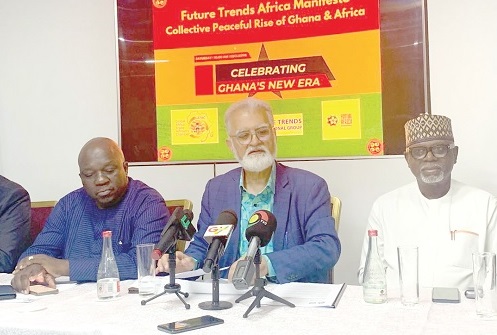
Future Trends proposes measures for Ghana’s accelerated development
A global business and strategic investments advisory organisation, Future Trends International, has suggested measures to help the nation accelerate its socio-economic development and turn it into an economic powerhouse.
Outlined in its “Future Trends Africa Manifesto,” the measures focus on transforming the country into a domestic wealth creation machinery and embarking on a domestic capital raising and capital formation strategy to help it move away from solely relying on Foreign Direct Investments and “handouts” to generate capital.
These, it believes, can be achieved through crowd financing — a kind of pooling of resources through apps, private entrepreneurship, internal mutual investments between cities, drastic reduction of bank interest rates for loan-to-enterprise and issuing of official outbound debt to Europe, accompanied by a “rigorous and elaborate” inventory taking of tangible and intangible assets for effective monetisation domestically, among others.
The delegation, in collaboration with Festac Africa Renaissance, therefore, offered its modelling and methodologies as a “special gift” to the nation and the new visionary leadership, to enhance their existing plans to uplift the fortunes of the people.
Event
Representatives of the organisation, who were in the country for the inauguration of President John Dramani Mahama, made the presentation at a press conference in Accra last Saturday.
Future Trends International and its Founder and President, Dr Farzam Kamalabadi, are acknowledged internationally for making significant contributions to China’s economic and cultural development by proposing initiatives such as the “China-Central Asia-Middle East economic corridor,” which aligned with the Asian country’s Belt and Road Initiative.
Leapfrog, $60 trillion
Dr Kamalabadi, drawing on China’s meteoric rise from a poor country to an economic giant in three decades, said Ghana and the rest of Africa could leapfrog its economic development in a much shorter period due to its extensive resources.
He described it as unfair how an entire continent of 54 countries with a population of 1.5 billion people and vast resources could have a GDP of $3 trillion while only China with relatively the same population size and much fewer resources was worth at least five times that.
In that vein, he said the time had come for Africa to abandon Agenda 2063, an African Union (AU) strategic framework for transforming the continent into a global powerhouse by 2063, describing it as “too far for too little.”
The AU intends to achieve Agenda 2063 by harnessing Africa’s resources, ensuring equitable growth and building strong institutions to achieve prosperity.
Dr Kamalabadi stated that Africa should be the richest continent in the world, stressing that with bold policies, strategic investments, the right mentality and innovations aimed at domestic wealth creation guided by the manifesto, Africa could have at least a $60 trillion economy in just 10 years and better the economic situation of its people.
“Africa, as a continent and nation upon nation, will have a total of $60 trillion economy in 10 years.
This is called meteoric rise. We cannot wait for slow and gradual. We have to array all the forces to the convergence so that the laser will lift Africa fast.
The benchmark is a move from $3 trillion to $60 trillion in one decade. 20x multiplier effect,” he said.
